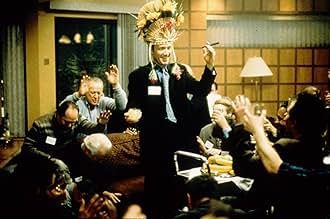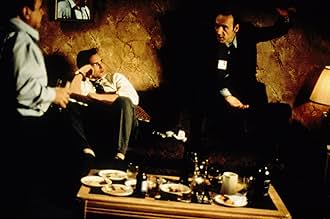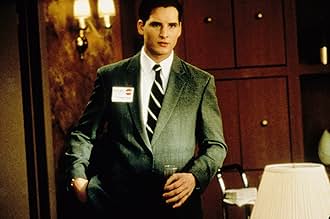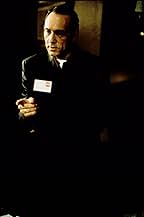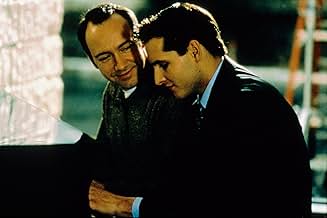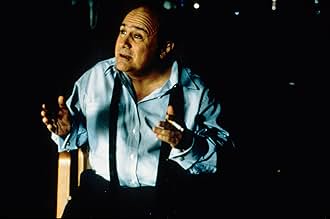PUNTUACIÓN EN IMDb
6,5/10
15 mil
TU PUNTUACIÓN
Dos vendedores veteranos examinan una propuesta de venta de un cliente particular a través de su joven discípulo.Dos vendedores veteranos examinan una propuesta de venta de un cliente particular a través de su joven discípulo.Dos vendedores veteranos examinan una propuesta de venta de un cliente particular a través de su joven discípulo.
- Premios
- 1 nominación en total
Danny DeVito
- Phil Cooper
- (as Danny Devito)
Christopher Donahue
- Bartender
- (sin acreditar)
Ron Komora
- The Big Kahuna
- (sin acreditar)
Frank L. Messina
- Business Man
- (sin acreditar)
George F. Miller
- Hotel Patron Leaving Lobby
- (sin acreditar)
Jen Taylor
- Mrs. Jen Johnson
- (sin acreditar)
Reseñas destacadas
10ToldYaSo
"The Big Kahuna" proved to be one of the finest offerings that I was privy to at the Toronto International Film Festival this year. The expression "saving the best for last" applies strongly to this film. We were fortunate to have a Q&A after the film with Roger Rueff, the screenwriter of this eloquently written piece, John Swanbeck, the director enjoying all that a first timer could hope for from his debut, and the gifted actor Kevin Spacey, who starred in and produced the film.
This marvellous examination of three men of different age groups at a convention in Wichita also features the talents of Danny DeVito who apparently came to the production in the proverbial last minute. This film was shot in a very short sixteen days which comes as a surprise, despite it's one central location, as the dialogue is so strong. The best way to describe it is as almost poetic.
The script was adapted from the play "Hospitality Suite", also written by Rueff, who revealed in the Q&A that the story was based upon his own experiences at a sales convention long ago. But he assured us that his character of the young, impressionable, bible thumping "Bob" was not based on himself. Rueff also noted that with this being his first screenplay, he had worried about the horror stories he heard where scripts are butchered and transformed into things the writer never intended in many Hollywood productions. But in this case, he trusted the director and cast implicitly and was not disappointed in any way.
Kevin Spacey shines in this sneak peak behind the scenes of a sales convention where the future of a company lies squarely on the shoulders of three men in the pursuit of a big client. The president of another company represents the biggest potential account they will ever have. They exchange stories, accounts and personal philosophies and find how different they are from one another based on what they've been through.
The interaction between the three actors is mesmerizing. They take the audience into what feels like a true life account documented verbatim. To say more would spoil the outcome for those who've not yet had a chance to enjoy this film. It is my strong recommendation that all of those who have not, do so at their first available opportunity.
This marvellous examination of three men of different age groups at a convention in Wichita also features the talents of Danny DeVito who apparently came to the production in the proverbial last minute. This film was shot in a very short sixteen days which comes as a surprise, despite it's one central location, as the dialogue is so strong. The best way to describe it is as almost poetic.
The script was adapted from the play "Hospitality Suite", also written by Rueff, who revealed in the Q&A that the story was based upon his own experiences at a sales convention long ago. But he assured us that his character of the young, impressionable, bible thumping "Bob" was not based on himself. Rueff also noted that with this being his first screenplay, he had worried about the horror stories he heard where scripts are butchered and transformed into things the writer never intended in many Hollywood productions. But in this case, he trusted the director and cast implicitly and was not disappointed in any way.
Kevin Spacey shines in this sneak peak behind the scenes of a sales convention where the future of a company lies squarely on the shoulders of three men in the pursuit of a big client. The president of another company represents the biggest potential account they will ever have. They exchange stories, accounts and personal philosophies and find how different they are from one another based on what they've been through.
The interaction between the three actors is mesmerizing. They take the audience into what feels like a true life account documented verbatim. To say more would spoil the outcome for those who've not yet had a chance to enjoy this film. It is my strong recommendation that all of those who have not, do so at their first available opportunity.
Though essentially little more than a stage bound version of the play, `Hospitality Suite,' the film entitled `The Big Kahuna' earns distinction for its sharply delineated characters and the finely wrought performances of its three main actors. In fact, the stage origins of the film are evident in the fact that the action rarely extends beyond a single set a hotel suite in Wichita, Kansas in which three salesman are gathered for a convention and the fact that only four people are even assigned speaking parts (and even the fourth is a mere walk-on bellboy). All the other people we see serve as a kind of silent backdrop before which the three principal players enact their complex personal drama.
Kevin Spacey, in a truly brilliant performance, plays Larry, a middle-aged, sardonic salesman who sees life strictly from the perspective of a hardcore cynic and who, consequently, runs roughshod over his two business associates with his acerbic wit and hardnosed bluntness. In total contrast is Bob (Peter Facinelli), a 20-something neophyte to the selling business, a sincere, well-intentioned, but hopelessly naïve born-again Christian, who has trouble separating his career as a salesman from his felt need to fulfill the Biblical edict to go out among men and spread the Good News. Caught between the two is Phil (Danny DeVito), a 52-year old man who, after years of devoting his life to the cause of selling, has begun to seriously question the validity of his life's work and has, therefore, recently found himself contemplating such weighty matters as suicide, the existence of God and the meaning of love and friendship. Obviously, such cleanly delineated characters could well have slid over into two-dimensional stereotypes, yet the author, Roger Rueff, in adapting his play to the screen, has built into each of the three principal figures a dimension of multifaceted human complexity. Larry, for instance, despite all of his facile cynicism, shows a far deeper side to his character when, in a quiet moment in which Phil pours his heart out to him, he offers his buddy the hand of genuine compassion and friendship. We discover that the often-bitter tone Larry displays to the world is just a façade, a cover-up for the void that lies deep within his own troubled psyche. Similarly, Rueff avoids the common trap of reducing the devout Christian character to the customary level of a mindless buffoon. Although we sense that Bob too uses his Christianity as a way of ordering his life - thereby avoiding the messy ugliness that a more freethinking life often requires - yet, Rueff merely implies that Bob has some growing up to do, not that his belief system must itself be jettisoned. And Phil, caught between these two worldviews, provides, out of his own confused weakness, the voice of reasoned sanity that helps Larry and Bob come to a final understanding and mutual appreciation of each other. He sees Larry plainly for who he is, yet Phil knows that this is the person who means more to him than anyone else in the world. Similarly, though he somewhat admires and respects Bob's sincere devotion to his Christian principles, Phil knows that Bob has a long way to go before he becomes a true `man of character.'
`The Big Kahuna' does not provide big laughs, though the sardonic wit often strikes a deep chord in the audience. The film may also seem claustrophobic to those who demand more movement from their movies. The dialogue, however, is consistently sharp and incisive, even though Phil's final speech borders a bit on the pedantic. (At this point, Phil's function as the author's mouthpiece becomes a bit heavy-handed to say the least). Nevertheless, for those in search of a fine character study, driven by strong performances and insightful observations about human nature, `The Big Kahuna' is definitely worth checking out.
Kevin Spacey, in a truly brilliant performance, plays Larry, a middle-aged, sardonic salesman who sees life strictly from the perspective of a hardcore cynic and who, consequently, runs roughshod over his two business associates with his acerbic wit and hardnosed bluntness. In total contrast is Bob (Peter Facinelli), a 20-something neophyte to the selling business, a sincere, well-intentioned, but hopelessly naïve born-again Christian, who has trouble separating his career as a salesman from his felt need to fulfill the Biblical edict to go out among men and spread the Good News. Caught between the two is Phil (Danny DeVito), a 52-year old man who, after years of devoting his life to the cause of selling, has begun to seriously question the validity of his life's work and has, therefore, recently found himself contemplating such weighty matters as suicide, the existence of God and the meaning of love and friendship. Obviously, such cleanly delineated characters could well have slid over into two-dimensional stereotypes, yet the author, Roger Rueff, in adapting his play to the screen, has built into each of the three principal figures a dimension of multifaceted human complexity. Larry, for instance, despite all of his facile cynicism, shows a far deeper side to his character when, in a quiet moment in which Phil pours his heart out to him, he offers his buddy the hand of genuine compassion and friendship. We discover that the often-bitter tone Larry displays to the world is just a façade, a cover-up for the void that lies deep within his own troubled psyche. Similarly, Rueff avoids the common trap of reducing the devout Christian character to the customary level of a mindless buffoon. Although we sense that Bob too uses his Christianity as a way of ordering his life - thereby avoiding the messy ugliness that a more freethinking life often requires - yet, Rueff merely implies that Bob has some growing up to do, not that his belief system must itself be jettisoned. And Phil, caught between these two worldviews, provides, out of his own confused weakness, the voice of reasoned sanity that helps Larry and Bob come to a final understanding and mutual appreciation of each other. He sees Larry plainly for who he is, yet Phil knows that this is the person who means more to him than anyone else in the world. Similarly, though he somewhat admires and respects Bob's sincere devotion to his Christian principles, Phil knows that Bob has a long way to go before he becomes a true `man of character.'
`The Big Kahuna' does not provide big laughs, though the sardonic wit often strikes a deep chord in the audience. The film may also seem claustrophobic to those who demand more movement from their movies. The dialogue, however, is consistently sharp and incisive, even though Phil's final speech borders a bit on the pedantic. (At this point, Phil's function as the author's mouthpiece becomes a bit heavy-handed to say the least). Nevertheless, for those in search of a fine character study, driven by strong performances and insightful observations about human nature, `The Big Kahuna' is definitely worth checking out.
The Big Kahuna
This three-character movie, based on the play by Roger Rueff, deals with salesmen who are somewhat impatiently waiting for a very important business client - a.k.a. The Big Kahuna - on whom the fortunes of their company rests. Should they land the contract with this mysterious bigwig, their company will prosper. If they don't land the contract, of course, then they're all sunk.
Larry (Kevin Spacey) and Phil (Danny DeVito) are the salesmen, and Bob (Peter Facinelli) is the marketing guy. Bob's a rookie, and Larry and Phil try to prep him for handling himself with potential customers. They've rented the hospitality suite in the hotel to entertain their clients and are planning on having a small party, hoping that the Big Kahuna will show up. No, it's not Waiting for Godot, but it's along those lines.
This is basically a character study. There's a lot of dialog - virtually the entire movie takes place in the suite, with only a few very minor scenes outside it - and each word is absolutely dripping with meaning. There aren't any throwaway lines in this movie, folks. Most movies contain generic lines that would fit in any similar movie. Not this one. If you're a fan of well-written movies, this is a prime example of how one should be constructed.
But with such an emphasis on the dialog, there's naturally little action. This is always a problem with movies based on plays. They come off restrained, stagey, and claustrophobic. But the lack of action actually gives the viewer the opportunity to watch two decidedly different acting styles. Spacey is bombastic, punctuating each syllable with a sneer or a rant. DeVito, on the other hand, is more reserved and appears wizened as a result. Each actor turns in a stunning performance, with Spacey basically reprising the role he played in Glengarry Glen Ross. The only one who seems out of place is Facinelli, who is ineffective as Bob the marketing guy.
The Big Kahuna is compelling, as long as you don't mind talky comedy-dramas.
This three-character movie, based on the play by Roger Rueff, deals with salesmen who are somewhat impatiently waiting for a very important business client - a.k.a. The Big Kahuna - on whom the fortunes of their company rests. Should they land the contract with this mysterious bigwig, their company will prosper. If they don't land the contract, of course, then they're all sunk.
Larry (Kevin Spacey) and Phil (Danny DeVito) are the salesmen, and Bob (Peter Facinelli) is the marketing guy. Bob's a rookie, and Larry and Phil try to prep him for handling himself with potential customers. They've rented the hospitality suite in the hotel to entertain their clients and are planning on having a small party, hoping that the Big Kahuna will show up. No, it's not Waiting for Godot, but it's along those lines.
This is basically a character study. There's a lot of dialog - virtually the entire movie takes place in the suite, with only a few very minor scenes outside it - and each word is absolutely dripping with meaning. There aren't any throwaway lines in this movie, folks. Most movies contain generic lines that would fit in any similar movie. Not this one. If you're a fan of well-written movies, this is a prime example of how one should be constructed.
But with such an emphasis on the dialog, there's naturally little action. This is always a problem with movies based on plays. They come off restrained, stagey, and claustrophobic. But the lack of action actually gives the viewer the opportunity to watch two decidedly different acting styles. Spacey is bombastic, punctuating each syllable with a sneer or a rant. DeVito, on the other hand, is more reserved and appears wizened as a result. Each actor turns in a stunning performance, with Spacey basically reprising the role he played in Glengarry Glen Ross. The only one who seems out of place is Facinelli, who is ineffective as Bob the marketing guy.
The Big Kahuna is compelling, as long as you don't mind talky comedy-dramas.
Would you sell your soul to sell industrial lubricants? Based on a stage play called 'Hospitality suite', The Big Kahuna contains only 3 main actors in this movie who all give powerful performances.
Spacey as the no nonsense take no prisoners step on em when he's down salesman, DeVito as his colleague who's had enough and thinks he's wasted his life going from nameless towns, and boring hotel rooms, and the young up and coming Peter Facinelli as the 6 month newcomer who is like a babe in the woods, but has a strong spiritual side and stronger convictions than anyone else.
Spacey is great as always, and Facinelli is very believable as the devout Baptist. But it is DeVito who steals this movie in what has to be the best role I have ever seen him portray. A funny expose and what it means to be truly successful and happy in career and life. Kahuna scores high!
This movie has just great dialogue, and some incredibly memorable lines most of it coming from Spacey who keeps hitting Facinelli over his head with his sharp brute and dirty yet smart mouth.
A definite must see for 2000.
Rating 8 out of 10.
Spacey as the no nonsense take no prisoners step on em when he's down salesman, DeVito as his colleague who's had enough and thinks he's wasted his life going from nameless towns, and boring hotel rooms, and the young up and coming Peter Facinelli as the 6 month newcomer who is like a babe in the woods, but has a strong spiritual side and stronger convictions than anyone else.
Spacey is great as always, and Facinelli is very believable as the devout Baptist. But it is DeVito who steals this movie in what has to be the best role I have ever seen him portray. A funny expose and what it means to be truly successful and happy in career and life. Kahuna scores high!
This movie has just great dialogue, and some incredibly memorable lines most of it coming from Spacey who keeps hitting Facinelli over his head with his sharp brute and dirty yet smart mouth.
A definite must see for 2000.
Rating 8 out of 10.
When I saw this movie, I had one sole motivation- It had Kevin Spacey in it. That, in my opinion, makes any of his films worth at least a glance. He's so brilliant. Also, I was in the mood for a good comedy. This film presented me with both the expected comedy and brilliant performance by Spacey. However, I guess I neglected to read up on what this movie was all about first.
Let me say that, as a Christian (and a Baptist), the portrayal of Bob is the single most realistic on screen portrayal of a true Christian that I have ever seen. Bravo to them for not giving into cliches! While some attacks were made on Bob's faith, they weren't presented as right or wrong, but different view points. I was frankly shocked (pleasently) by this film. I would deffinately recommend it.
Also, I am not a particurally big DeVito fan, but he turns in a truly moving and realistic performance in this film.
7/10
Let me say that, as a Christian (and a Baptist), the portrayal of Bob is the single most realistic on screen portrayal of a true Christian that I have ever seen. Bravo to them for not giving into cliches! While some attacks were made on Bob's faith, they weren't presented as right or wrong, but different view points. I was frankly shocked (pleasently) by this film. I would deffinately recommend it.
Also, I am not a particurally big DeVito fan, but he turns in a truly moving and realistic performance in this film.
7/10
¿Sabías que...?
- CuriosidadesKevin Spacey's character, Larry Mann is a salesman that talks about manipulating clients throughout the movie. At about the 34 minute mark he wears the hat featured in the movie's poster and is apparently pitching to a group of clients. The pitch is inaudible since there's music playing, a trumpet-orchestra version of Henry Mancini's theme for Charada (1963) which starred Cary Grant and Audrey Hepburn, a movie that revolved around lies, deception and deceit.
- PifiasWhen Larry attacks Bob he pushes him on a table with food and juice glasses. But when Bob gets up a moment later there are no stains on the back of his white shirt.
- Citas
Larry Mann: There are people in this world, Bob, who look very official while they are doing what they are doing. And do you know why?
Bob Walker: Why?
Larry Mann: Because they don't know what they are doing. Because if you know what you are doing, then you don't have to look like you know what you are doing, because it comes naturally.
- Banda sonoraHey Pachuco!
Written by Eddie Nichols, James Achor & Mando Dorame
Performed by Royal Crown Revue
Published by Zip Gun Music, J. Achor Music & Dorame Music
Courtesy of Warner Bros. Records Inc.
By arrangement with Warner Special Products
Selecciones populares
Inicia sesión para calificar y añadir a tu lista para recibir recomendaciones personalizadas
- How long is The Big Kahuna?Con tecnología de Alexa
Detalles
Taquilla
- Presupuesto
- 7.000.000 US$ (estimación)
- Recaudación en Estados Unidos y Canadá
- 3.165.544 US$
- Fin de semana de estreno en EE. UU. y Canadá
- 80.957 US$
- 30 abr 2000
- Recaudación en todo el mundo
- 3.728.888 US$
- Duración1 hora 30 minutos
- Color
- Mezcla de sonido
- Relación de aspecto
- 1.85 : 1
Contribuir a esta página
Sugerir un cambio o añadir el contenido que falta

Principal laguna de datos
By what name was El pez gordo (1999) officially released in India in English?
Responde

